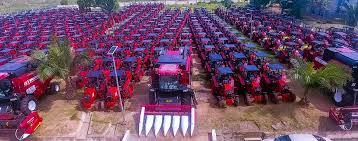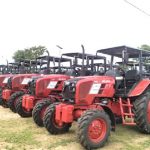In a major push to modernise Nigeria’s agricultural sector, President Bola Ahmed Tinubu yesterday flagged off the distribution of thousands of farm machinery and equipment, signaling a shift from traditional subsistence farming to mechanised, technology-driven agriculture.
During an official ceremony in Abuja, Tinubu unveiled a consignment of 2,000 tractors, 2,000 disc ploughs and harrows, 1,000 disc ridgers, 1,200 tractor-trailers, 500 seed drills, 300 boom sprayers, 10 harvesters, 12 mobile workshop vehicles, and 9,022 spare part sets—all recently imported from Belarus, Eastern Europe. The initiative is the result of a bilateral agreement with the Belarusian government.
“This day marks the beginning of Nigeria’s agricultural renewal,” Tinubu said, affirming his administration’s promise to transform agriculture into a high-output, job-creating sector. “We are not just aiming to feed ourselves but to become a global player in agriculture.”
The new mechanisation effort is part of a broader programme aimed at converting 550,000 hectares of farmland into active production zones, projected to yield over two million metric tons of food annually and create more than 16,000 jobs across the country. The government is also launching a national training scheme to ensure farmers, technicians, and operators are skilled in the proper use, servicing, and maintenance of the equipment.
Tinubu noted that the project is designed to attract youth into agriculture by shifting perceptions of farming as outdated and labor-intensive. “We are making farming more attractive to young people. It’s not just hoes and cutlasses anymore. Agriculture is now about innovation, entrepreneurship, and nation-building,” he said.
The programme comes equipped with GPS-enabled tracking for the equipment, a structured repayment and repossession model for long-term sustainability, and financing options through partnerships with development finance institutions and non-interest banks.
President Tinubu called on state governments, cooperatives, and service providers to ensure transparent and effective deployment of the machinery. “We will work with you, supervise you, and hold you accountable,” he said.
The Minister of Agriculture and Food Security, Abubakar Kyari, hailed the launch as the fulfilment of Tinubu’s emergency declaration on food security announced in July 2023. He said new mechanisation hubs will be established close to farming clusters to provide easy access to maintenance and technical support.
Also speaking at the event, an agricultural stakeholder pointed out that Nigeria’s low tractor-to-hectare ratio has been a major obstacle to boosting productivity. He expressed optimism that with proper use of the new machines, farmers will significantly improve yields and scale up production.
This nationwide rollout marks one of the largest mechanized agriculture drives in recent Nigerian history and forms a key part of the government’s strategy to ensure food security, empower rural communities, and diversify the economy beyond oil.










